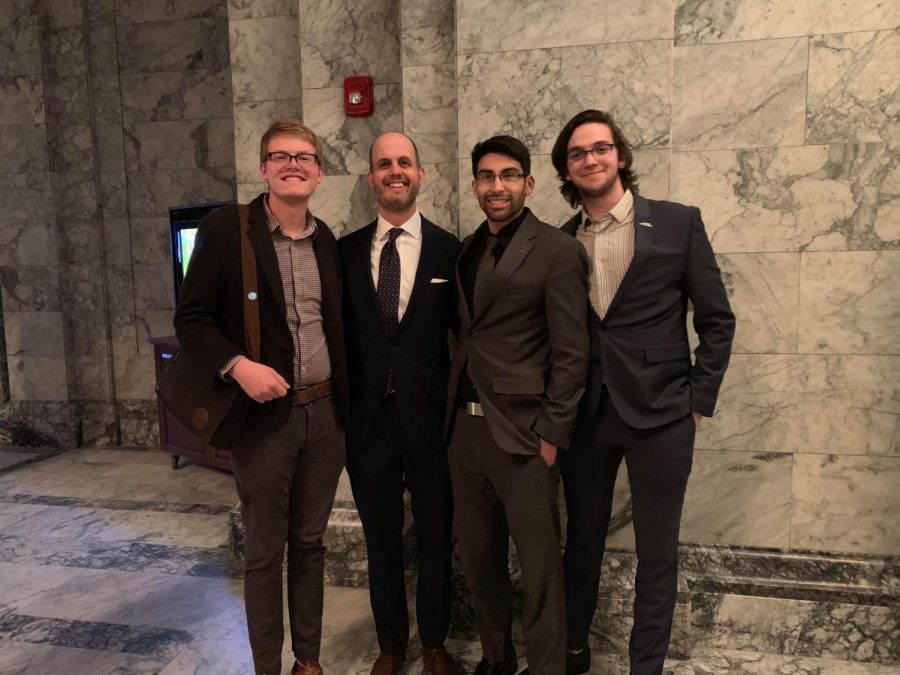Student helps others: Financial aid bill passes
Representative Drew Hansen (center left) who wrote HB 2158, with some of the student legislative liaisons who helped him get the bill passed (left to right) Zack Turner (CWU), Adan Espino (University of Wash- ington), Henry Pollet (Webster Washington University).
May 9, 2019
Funding bill passes
With the help of students across the state of Washington, including one from CWU, a bill has been passed in the Washington House of Representatives. The bill is the largest single investment the state has ever made to higher education. House Bill (HB) 2158 puts over $375 million toward different measures to boost Washington state’s higher education attendance by improving affordability, the most notable of which is called the Washington College Grant program.
The main part of this program is free tuition and fees for students whose families make up 55 percent of Washington’s median income, or about $50,000 a year. The program also provides partial scholarships for families earning more than this threshold.
Guillermo Rogel Jr. is the Executive Director for the Washington Student Association (WSA) and has been a big advocate for bills like this one aimed at supporting students. He said that this is part of efforts to get attendance in higher education back to levels they were at before the 2008 recession. After the recession, higher education was one of the first places Washington state legislators looked to for budget cuts which drastically reduced higher education attendance.
Every year the ASCWU Office of Legislative Affairs sends a legislative liaison to work at the state capital in Olympia during the legislative session. This student works with other legislative liaisons from all of the public four-year institutions in the state, along with the WSA. Zack Turner, political science major and the ASCWU VP-elect of legislative affairs, was that student this year. He and several other students from around Washington were in Olympia on April 26 when the bill got passed.
“We go meet with legislators and we use our influence to go around and say ‘this is what we want, this is what we want, etc.’ and just bug the hell out of them,” Turner said. “We just keep calling and sending them letters and set up meetings until they help sponsor the bill.”
Though the Washington College Grant program is by far the largest part of the bill, HB 2158 does several other things to help higher education in the state.
Loan Refinance Program
HB 2158 creates a student loan refinance program so those with private loans taken out for higher education can get those loans refinanced by the state at a very low interest rate.
Funding Non-College Education
The Career Connected Learning Grant is designed to help pay for trade schools and apprenticeship programs for those whose prospective careers don’t require a college degree.
Subsidized Child Care
Expansions to the Working Child Connection Care program remove the previous work requirement which mandated that parents need to work at least to get subsidized child care. This was while full-time students were restricted from working over 19 hours per week.
Veteran Support
For veterans going to college, the bill removes the previous 200-credit cap on tuition waivers which prevented some veterans from entering some fields like education and science, technology, engineering and math (STEM) which often have college programs that exceed 200 credits.
Funding for Native American Students
The Washington Opportunity Scholarship allows Native American tribes to put money into a fund which is then matched dollar-for-dollar by the state before being provided to members of the tribes attending higher education.
Funding the Bill
HB 2158 is being funded with an increase in taxes on businesses which require workers with higher education, such as doctors, lawyers and engineers. Because of this increase in taxes Republicans in the Washington House of Representatives heavily opposed the bill. However, some of the businesses which would be facing increased taxes have come out in support of the bill. Microsoft, along with Amazon, is facing some of the biggest tax increases. In an op-ed for the Seattle Times, Microsoft President Brad Smith called on Microsoft and other big tech companies to contribute more to higher education so an economic catastrophe like the 2008 recession doesn’t have as much of an impact.
“We must act now when our economy is healthy. We need to structure a dedicated fund that will better ride out and resist budget cuts when, sooner or later, we inevitably confront the next recession,” Smith said. “Let’s ask the largest companies in the tech sector, which are the largest employers of high-skilled talent, to do a bit more.”
The bill will come into effect over the next two years, most likely being fully implemented in time for the 2020-21 academic year. When that happens, all students will need to do is apply for financial aid in order to take advantage of the new financial assistance being provided to them.




Grizzly • May 15, 2019 at 6:02 pm
How will these companies compensate for the increased taxes…